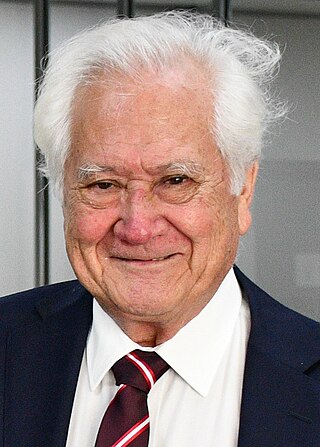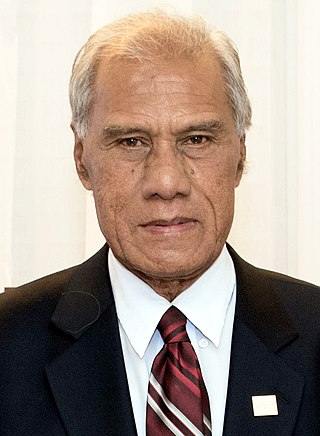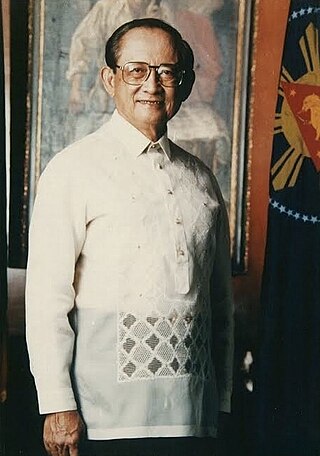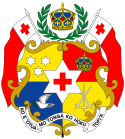
The history of Tonga is recorded since the ninth century BC, when seafarers associated with the Lapita diaspora first settled the islands which now make up the Kingdom of Tonga. Along with Fiji and Samoa, the area served as a gateway into the rest of the Pacific region known as Polynesia. Ancient Tongan mythologies recorded by early European explorers report the islands of 'Ata and Tongatapu as the first islands having been hauled to the surface from the deep ocean by Maui.

Feleti Vakaʻuta Sevele, Lord Sevele of Vailahi is a Tongan politician who served as the prime minister of Tonga from 30 March 2006 to 22 December 2010.

The Legislative Assembly of Tonga is the unicameral legislature of Tonga.
This list of presidential elections in the Philippines includes election results of both presidential and vice presidential elections since 1899 with the candidates' political party and their corresponding percentage.

General elections were held in Tonga on 23 and 24 April 2008 to elect members of the Legislative Assembly. The nobles were elected on 23 April, and the nine people's representatives on 24 April. A total of 32,000 people turned out to vote, giving a turnout of 48%.

Samiuela ʻAkilisi Pōhiva was a Tongan pro-democracy activist and politician. A key leader of the Democratic Party of the Friendly Islands (DPFI), he served as the Prime Minister of Tonga from 2014 to his death in 2019. He was only the fourth commoner to serve as Prime Minister, and the first commoner to be elected to that position by Parliament rather than appointed by the King.

General elections were held in Tonga on 14 and 15 February 1990 to elect members of the Legislative Assembly of Tonga. Nine nobles and nine people's representatives were elected. Seven of the latter favoured democratic reform. Voter turnout was 65.4%.

General elections were held in Tonga on 18 and 19 February 1987 to elect members of the Legislative Assembly of Tonga. Nine nobles and nine people's representatives were elected. Five of the latter favoured democratic reform.

The 1961 Philippine presidential and vice presidential elections were held on November 14, 1961. Incumbent president Carlos P. Garcia lost his opportunity for a second full term as president of the Philippines to Vice President Diosdado Macapagal. His running mate, Senator Gil J. Puyat, lost to Senator Emmanuel Pelaez. Six candidates ran for president, four of whom got nine votes nationwide together. This was the only election in Philippine electoral history in which a vice-president defeated the incumbent president.

Semisi Kioa Lafu Sika is a Tongan politician, businessman, and Member of the Tongan Parliament from 2010 to 2021. He served as acting prime minister in September 2019, following the death of ʻAkilisi Pōhiva. He is currently leader of the Democratic Party of the Friendly Islands.
Elections for the president, vice-president, members of the Senate, members of the House of Representatives and local positions were held on April 23, 1946, pursuant to Commonwealth Act No. 725

Siale ʻAtaongo Kaho, Lord Tuʻivakanō is a Tongan politician who served as the prime minister of Tonga from 2010 to 2014.

Presidential and vice presidential elections, legislative elections and local elections were held in the Philippines on May 11, 1992. An estimated 80,000 candidates ran for 17,000 posts from the presidency down to municipal councillors in the first general election under the 1987 Constitution. Even though she was permitted by the Constitution to run for a second term, President Corazon Aquino did not stand for re-election.

Dr. Viliami Uasike Latu is a Tongan politician and Cabinet Minister.

General elections were held in Tonga on 16 November 2017 to elect 17 of the 26 seats to the Legislative Assembly. King Tupou VI dissolved the Assembly on 25 August 2017 on the advice of its Speaker, Sialeʻataongo Tuʻivakanō, who claimed that Prime Minister ʻAkilisi Pohiva was attempting to claim powers held by the King and Privy Council within Cabinet.

ʻAkosita Havili Lavulavu is a Tongan politician and former Cabinet Minister. In 2021 she was jailed for fraud.

General elections were held in Tonga in 1930.

Siaosi ‘Ofakivahafolau Sovaleni, styled Hon. Hu‘akavameiliku, is a Tongan politician who served as the Prime Minister of Tonga from 2021 until his resignation in 2024. He had previously served as a Cabinet Minister, and from 2014 to 2017, he was Deputy Prime Minister of Tonga. He is the current estate holder of the village of Ha'asini.
Poasi Mataele Tei is a Tongan politician and former Member of the Legislative Assembly of Tonga.
Tevita Lavemaau is a Tongan politician and Member of the Legislative Assembly of Tonga.













